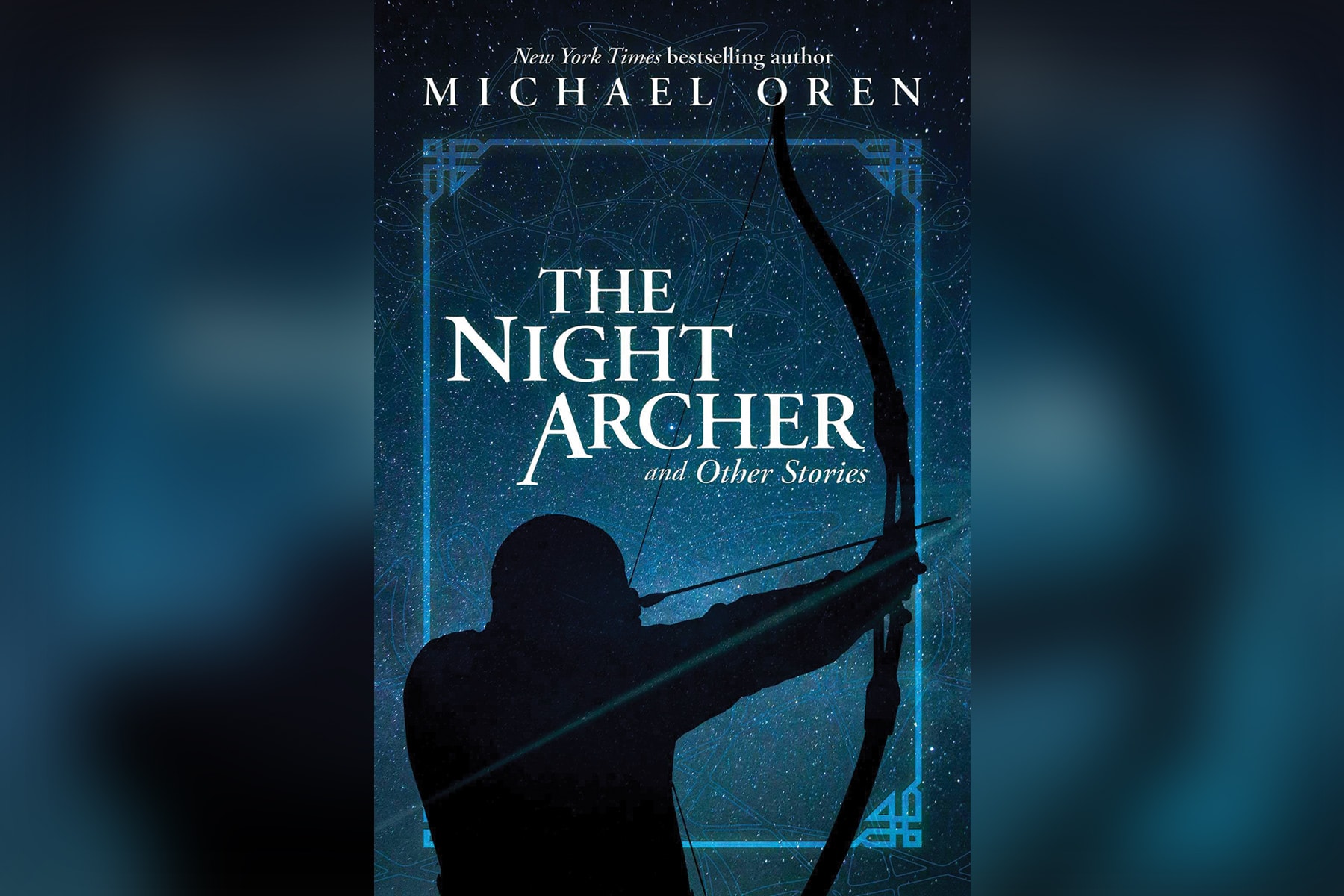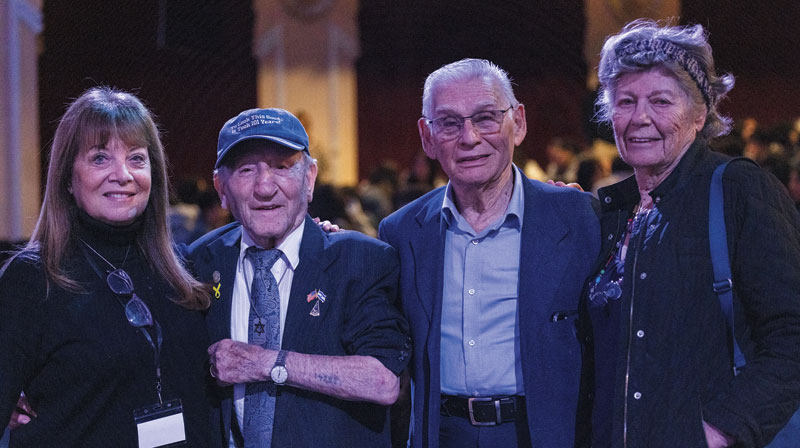
We first came to know Michael Oren as a historian and the author of best-selling history books such as “Power, Faith, and Fantasy” and “Six Days of War.” Then he reinvented himself as a diplomat, serving the State of Israel as ambassador to the United States. Now we meet Oren as a teller of tales. “The Night Archer and Other Stories” (Post Hill Press/A Wicked Son Book) is a collection of 51 short stories, each one exquisitely crafted and deeply revealing.
Oren was born in New York in 1955, made aliyah in 1979 and served as a paratrooper in the war in Lebanon in 1982. All of these waypoints in his biography are touched on in his short stories, sometimes plainly and sometimes obliquely, but always with precision and impact. “They are American in their candor,” he writes of his stories, “and Israeli in their zeal, yet always, paradoxically, Jewish.” Thus, for example, the title story in the collection introduces us to an archer from the battle of Agincourt, a figure whom the narrator conjures up every night as a comrade in arms in his struggle against insomnia.
“We’ve never met, yet you join me every night,” Oren writes. “Where most others see an in-gathering of angels or sheep, the harbinger of peace, I glimpse an army bristling with lances and blades clamoring off to war.”
Every story in the collection is told in lapidary prose, but the subject matter is dazzling in its diversity. Here are ghost stories, crime stories, science fiction stories, love stories, adventure stories, Bible stories, war stories, stories of childhood and death, suffering and redemption, even a kind of updated bubbe meise (“The Old Osifagus”). What they all have in common is Oren’s mastery of compressive narration, his ability to put the reader at the very heart of the story from the first page, even the first line. Both the here and now and the backstory snap into sharp focus.
The fact that Oren first distinguished himself in the study of history is a clue to what attracts his eye and occupies his thoughts. Even when the narrator of a story is a ghost, as in “Ruin,” the historian in Oren always asserts himself. “We don’t shriek, we don’t whimper,” the narrator observes. “We merely observe and bear witness. Ghosts, you see, aren’t scary. People are scary.” And, in the story titled “The Secret of 16/B,” the search for historical artifacts by archaeologists results in the discovery of an ancient secret and, at the same time, sparks a contemporary conflict: “The Ultra-Orthodox Jews protested the desecration of their ancestors’ bones and Palestinian Arabs demonstrated against an attempt — so they saw it — to stake an Israeli claim to their land.”
The subject matter is dazzling in its diversity. Here are ghost stories, crime stories, science fiction stories, love stories, adventure stories, Bible stories, war stories, stories of childhood and death, suffering and redemption, even a kind of updated bubbe meise.
Only rarely do the stories directly address the practices of Judaism, and when they do, the point can be darkly ironic. “Afikomen” is one example. The 13-year-old narrator is given the task of hiding the afikomen at an otherwise boring family seder, but the hiding place he seeks out is already in use by his father. What the boy finds there is not less than shattering. “I want to look longer and I don’t want to look at all, ever” the boy recalls. Yet the boy turns the moment to his profit as a kind of compensation for the pain he will surely suffer for the rest of his life.
In the same ironic spirit, Oren unabashedly offers a kind of midrash on Genesis in “Day Eight.” When God thinks he has completed his work of creation, Satan sidles up to the Almighty. “Why be hasty,” he says. “Perhaps there are other things you could do.” At his urging, God gives additional gifts to humankind — consciousness of the certainty of death, the ability to both love and hate, to hope and fear. “In short,” says Satan, “we’ll have to give them souls.” As a result, the story concludes, God hears our prayers only with difficulty. “Drowning them out was a cacophony of birds and the braying of lions, laced with satanic chuckles.”
Many of the stories are short and spare, but a few are more fully realized. “Aniksht,” for example, is a tale that begins with a little girl in a Lithuanian village during World War II. Her father is “a man of secrets,” some of which she succeeds in discovering, and she has secrets of her own. Her father is an atheist, her mother goes to shul, but she imagines herself to be Dalia, “the pagan goddess of fate.” The forest in which she seeks solace turns out to be a place where secrets are revealed. She witnesses what we have come to call a crime against humanity, but for the little girl it is a crime against her father, mother and baby brother, Emmanuel.
“There is no more arguing,” she muses, “no more crying — even Emmanuel is still — no books or prayers, God or truth.”
Yet the story only begins at that moment of loss. Oren carries us back and forth in time and place, taking us from Lithuania to Israel and back again. At last, a man named Dudu reconnects with the lost and forgotten souls of his dead family in the same place where Daria once witnessed their deaths. He is a prominent Israeli politician, media-savvy and worldly wise, but cannot resist the call that summons him back into the past. “Butterflies, like the hands of luminous children, beckoned,” the story ends. “ ‘Come,’ they called to him, ‘come.’ ”
Oren reveals that writing was actually his first calling. At the age of 12, he was inspired to compose a poem titled “Who cries for the soul of the pigeon?” Significantly, young Oren came to understand that writing is essentially an exercise in imposing order on one’s thoughts and experiences. In the introduction to “The Night Archer,” he allows us to understand that his approach to writing and his approach to politics are essentially the same. “Overly fettered freedom is tyranny,” he concedes, but he also insists that “untethered freedom is chaos.”
His literary credo helps to explain why Oren is rooted in the center-right of Israeli politics, but he claims that it embodies a higher truth: “[F]reedom through confinement was more than just a method,” Oren declares. “Rather, like monotheism and universal morality, it was eminently a Jewish idea.” Where to find a balance between freedom and confinement remains open to debate, of course, but we can all find something to admire, savor and enjoy in “The Night Archer.”
Jonathan Kirsch, author and publishing attorney, is the book editor of the Jewish Journal.























 More news and opinions than at a Shabbat dinner, right in your inbox.
More news and opinions than at a Shabbat dinner, right in your inbox.